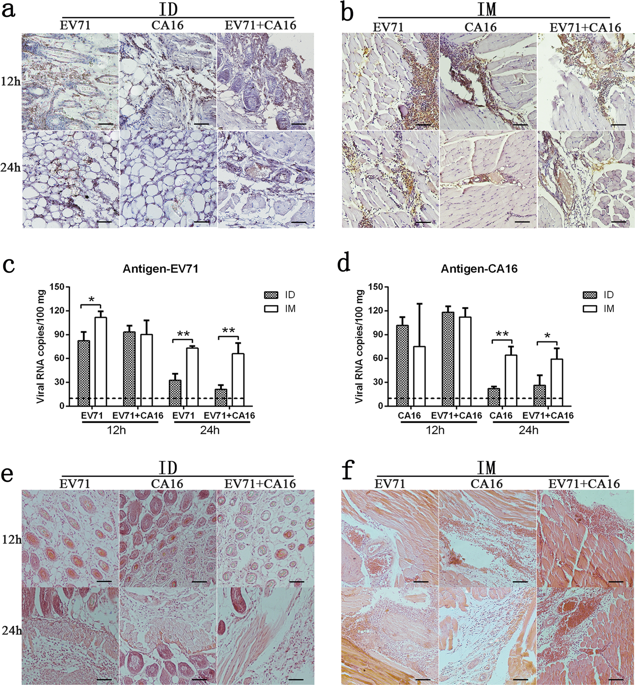npj Vaccines ( IF 9.2 ) Pub Date : 2019-03-27 , DOI: 10.1038/s41541-019-0108-6 Shengtao Fan , Yun Liao , Yaru Lian , Guorun Jiang , Li Jiang , Chenhong Dong , Erxia Yang , Lichun Wang , Xingli Xu , Min Feng , Ying Zhang , Qihan Li

|
Enterovirus type 71 (EV71) and coxsackievirus A 16 (CA16) are the major pathogens of human hand, foot, and mouth disease (HFMD). In our previous study, intramuscular immunization with the inactivated EV71 vaccine elicited effective immunity, while immunization with the inactivated CA16 vaccine did not. In this report, we focused on innate immune responses elicited by inactivated EV71 and CA16 antigens administered intradermally or intramuscularly. The distributions of the EV71 and CA16 antigens administered intradermally or intramuscularly were not obviously different, but the antigens were detected for a shorter period of time when administered intradermally. The expression levels of NF-κB pathway signaling molecules, which were identified as being capable of activating DCs, ILCs, and T cells, were higher in the intradermal group than in the intramuscular group. Antibodies for the EV71 and CA16 antigens colocalized with ILCs and DCs in skin and muscle tissues under fluorescence microscopy. Interestingly, ILC colocalization decreased over time, while DC colocalization increased over time. ELISpot analysis showed that coordination between DCs and ILCs contributed to successful adaptive immunity against vaccine antigens in the skin. EV71 and/or CA16 antigen immunization via the intradermal route was more capable of significantly increasing neutralizing antibody titers and activating specific T cell responses than immunization via the intramuscular route. Furthermore, neonatal mice born to mothers immunized with the EV71 and CA16 antigens were 100% protected against wild-type EV71 or CA16 viral challenge. Together, our results provide new insights into the development of vaccines for HFMD.
中文翻译:

先天性淋巴样细胞和树突状细胞在肠病毒抗原皮内免疫中的作用
71型肠病毒(EV71)和柯萨奇病毒A 16(CA16)是人类手足口病(HFMD)的主要病原体。在我们先前的研究中,用灭活的EV71疫苗进行肌内免疫可产生有效的免疫力,而用灭活的CA16疫苗则不能。在本报告中,我们集中于皮内或肌内注射灭活的EV71和CA16抗原引起的先天性免疫反应。皮内或肌内注射的EV71和CA16抗原的分布没有明显差异,但皮内注射时检测到的抗原时间较短。NF-κB通路信号分子的表达水平被确定为能够激活DC,ILC和T细胞,皮内注射组比肌内注射组高。在荧光显微镜下,EV71和CA16抗原的抗体与皮肤和肌肉组织中的ILC和DC共定位。有趣的是,ILC共定位随时间降低,而DC共定位随时间增加。ELISpot分析表明,DC和ILC之间的协调有助于成功针对皮肤中的疫苗抗原进行自适应免疫。通过皮内途径进行的EV71和/或CA16抗原免疫比通过肌肉内途径进行的免疫更能显着提高中和抗体的滴度并激活特异性T细胞应答。此外,使用EV71和CA16抗原免疫的母亲所生的新生小鼠100%受到了野生型EV71或CA16病毒攻击的保护。一起,



























 京公网安备 11010802027423号
京公网安备 11010802027423号